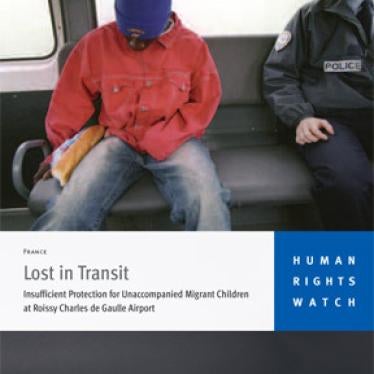(Brussels) - The European Union Justice and Home Affairs Council conclusions on unaccompanied migrant children focus too much on how to send them back to their countries of origin and too little on how to guarantee their safety, Human Rights Watch said today. The conclusions were adopted on June 3, 2010.
"Returning migrant children to their country of origin just won't work for every child," said Simone Troller, children's rights researcher at Human Rights Watch. "Before deporting vulnerable kids to places like Afghanistan, EU governments need to make sure it is in the children's best interests."
The conclusions by the Justice and Home Affairs Council contain important positive points, Human Rights Watch said. Those include recognition of the rights of these unaccompanied children and the need to protect them, the need to address gaps in legislation and practice, and the importance of identifying solutions to meet the child's long-term needs based on an assessment of each child's situation and needs.
However, the conclusions unduly emphasize returning these children to their country of origin over other options, Human Rights Watch said. And they omit the need to ensure critical safeguards such as access to guardians and lawyers for unaccompanied children in the EU, which put children at risk of being sent back in violation of international obligations.
A growing number of EU members and other European countries are actively planning the return of unaccompanied migrant children to countries of origin, in particular to Afghanistan.
The UK Border Agency published a £4 million tender in late March to operate a reception center in Afghanistan, and to provide reintegration assistance for approximately 12 boys, ages 16 and 17, and 120 adults a month, following their deportation from the UK. Norway, which is not a EU member, has announced a plan to build a care center in the Afghan capital, Kabul, in reaction to an increasing number of unaccompanied Afghan children arriving in Norway. Sweden, Denmark, and the Netherlands also plan to return Afghan children to a reception center, according to press reports.
In February, the UK government circulated a policy paper on unaccompanied minors during a Brussels workshop that calls for an "EU-wide presumption" that a child's best interest is to return. It also argues against formal safeguards like guardianship as "immensely expensive to put in place."
"Recent government statements confirm our fears that EU member states are willing to override safety concerns and children's interests in order to rid themselves of responsibilities generated by migrant children in Europe," Troller said.
Human Rights Watch sent a letter to the government of Norway on February 9 asking what procedural guarantees are in place to ensure that a child's return is in his or her best interests, and how the child is able to bring a legal challenge against such return decisions.
The letter also asked how a reception facility in Afghanistan would be coordinated with the country's existing services for children. The letter expressed concern that it would create problems by providing services to children returned, but not necessarily to other children in need. The same concerns apply to similar plans by EU member states.
The Norwegian government so far only provided a short response that did not answer these questions.
The EU's increasing attention to the fate of unaccompanied migrant children arriving to Europe is a step in the right direction, Human Rights Watch said. In its five-year asylum and migration strategy (part of the "Stockholm Program") adopted at the end of 2009, the EU calls for a joint and comprehensive response to address these children's fate, taking into account the children's best interests, and the elaboration of an action plan.
The European Commission followed up on this call and presented its action plan on unaccompanied migrant children on May 6. The plan highlights existing gaps in laws and policies, takes a comprehensive approach in addressing challenges to meet these children's needs, proposes common standards on guardianship and lawyers for children, and describes the complex reasons behind these children's migration and the difficulties in identifying a long-term solution that serves their interests. The Council conclusions adopted yesterday represent member states' joint response to the action plan and define further EU action in this area.
The United Nations Convention on the Rights of the Child, the European Convention on Human Rights, and the EU Fundamental Rights Charter all demand special protection to children separated from their families, requiring decisions to return a child to be based on "the best interests of the child" and prohibiting the return of children to places where their safety and well-being is at risk.
Human Rights Watch, jointly with Save the Children and the Separated Children in Europe Programme, wrote on June 3 to EU governments, calling on them to recognize the need for children to be represented by guardians and lawyers when confronted with a return decision, and not to rush with plans that fail to address complex situations and might put children at risk.
"The EU Council conclusions appear to give member states the green light to move ahead with returns that could put children at risk," Troller said. "EU states need to put the needs of vulnerable children first."







